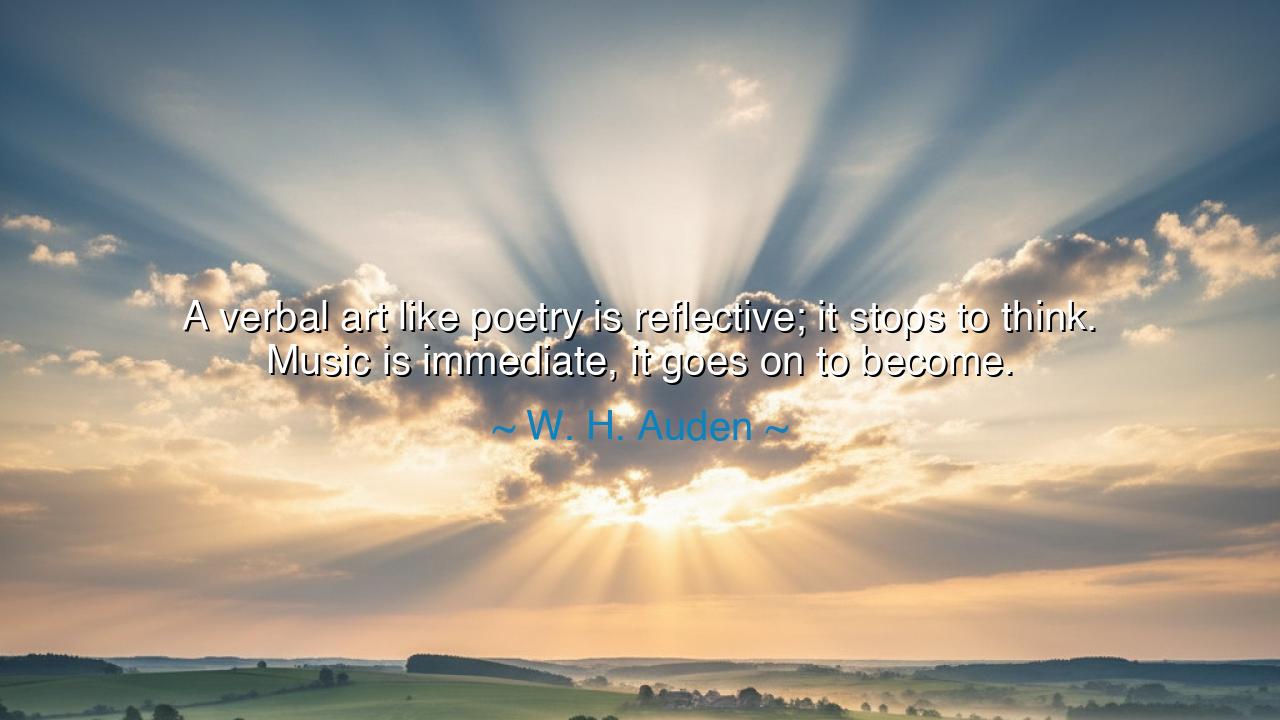
A verbal art like poetry is reflective; it stops to think. Music
A verbal art like poetry is reflective; it stops to think. Music is immediate, it goes on to become.






Hear, then, the words of the poet W. H. Auden, who declared: “A verbal art like poetry is reflective; it stops to think. Music is immediate, it goes on to become.” In these words lies a truth as old as creation itself, for he speaks of the two great rivers of expression—poetry and music—and how they flow differently through the soul of humankind. One pauses, turns inward, and contemplates; the other surges forward, unstoppable, carrying both listener and creator into the vast unknown of becoming.
The ancients knew the power of reflection. They turned to poetry, not only as ornament, but as the vessel of thought, as the mirror in which the heart beholds itself. Poetry is a lamp in the darkness, lighting the inner chambers of the mind, asking: What does this mean? What am I? Why do we exist? Thus Auden speaks rightly: poetry stops to think. It is deliberate, measured, heavy with meaning. Like the philosopher sitting in silence, it halts the rushing of time so that we might gaze into the eternal.
Yet music belongs to a different realm. It does not stop; it does not pause to ask why. It sweeps us away, as a river carries driftwood, as the wind bears the cry of birds across the sea. Music is immediate—its truth is not in thought, but in experience. It speaks without words, it pierces the heart directly, and it moves even those who cannot explain it. Music is pure becoming, the sound of life unfolding, the rush of existence itself.
Think of Beethoven, who, though deaf, composed symphonies that thunder with the fire of creation. Could such works have been born of reflection alone? No—his music did not stop to ponder; it surged from his spirit as though the universe itself were singing through him. When one hears the Ninth Symphony, one does not stop to analyze each note; one is swept into joy, into triumph, into something larger than oneself. That is the immediacy Auden speaks of: music becoming, carrying all who hear it into transformation.
But there are also moments when these two rivers meet. Consider Homer, whose epics were sung as poetry, both reflective and immediate. His verses called men to remember the deeds of heroes, yet through song they were carried into the hearts of listeners with living fire. Here lies the mystery: that reflection and immediacy are not enemies, but twin flames, each showing us a different face of truth. Poetry makes us pause, music makes us move, and together they awaken both mind and soul.
To you who hear these teachings, know this: there are times in life when you must be like poetry, stopping to think, reflecting deeply, questioning the path you walk. But there are also times when you must be like music, not pausing, not doubting, but moving forward with energy, courage, and passion. Wisdom is knowing when to pause and when to surge, when to reflect and when to become.
Practical guidance follows: when you feel lost, turn to poetry—whether in written verse or in your own reflection. Let it help you see clearly the truths hidden within. But when you know your path, turn to music—in song, in action, in movement—and let yourself flow without hesitation. Live both as the poet and the musician, for only then will your life be both deep and full, both thoughtful and alive.
Thus remember Auden’s words: poetry is reflection, music is becoming. Take this dual wisdom into your days. Think deeply, yet also live boldly. Pause when you must, but when the time for action comes, let your life move like music—immediate, unyielding, and filled with the power of becoming.






AAdministratorAdministrator
Welcome, honored guests. Please leave a comment, we will respond soon